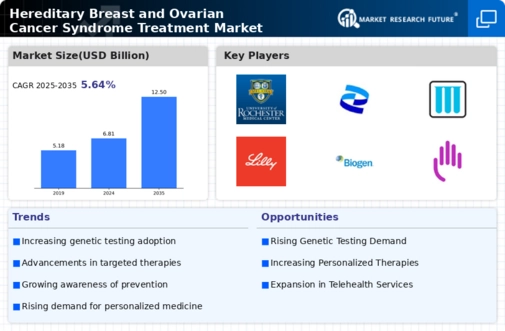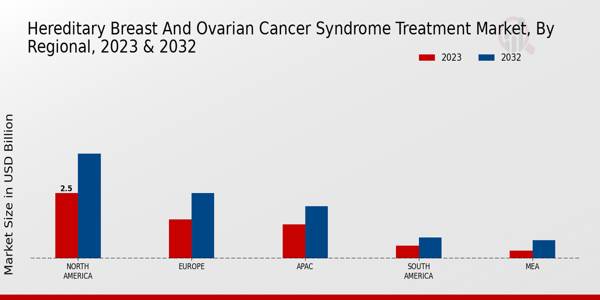The Hereditary Breast and Ovarian Cancer Syndrome Treatment Market has seen significant growth due to a heightened awareness of genetic predispositions and advancements in treatment options. As more individuals seek genetic testing and personalized therapies, a competitive landscape has emerged, characterized by innovation, strategic partnerships, and a focus on research and development. Key players in this market are leveraging their expertise to offer targeted therapies and improve patient outcomes, thereby enhancing their market share. The rising incidence of hereditary breast and ovarian cancer has also prompted pharmaceutical companies to expand their product portfolios, leading to intensified competition among major players.
As regulatory approvals for new therapies become more streamlined, the market continues to evolve, fostering a dynamic environment for both established firms and newcomers.Roche stands out in the Hereditary Breast and Ovarian Cancer Syndrome Treatment Market for its robust product pipeline and commitment to addressing unmet medical needs in cancer treatment. The company has significantly invested in research, focusing on personalized medicine tailored to the specific genetic profiles of patients. Roche's innovations in targeted therapies have positioned it as a leader in the development of treatments that specifically benefit patients with hereditary cancer syndromes.
With strong clinical trial results and a reputation for high-quality products, Roche has established a solid footing in the market, which is further strengthened by strategic collaborations with various research institutions and healthcare organizations. This collaborative approach not only enhances Roche's capabilities in delivering effective treatments but also promotes ongoing advancements in the understanding of hereditary cancer mechanisms.Pfizer has made a notable impact in the Hereditary Breast and Ovarian Cancer Syndrome Treatment Market through its strong emphasis on innovative therapies and expanding treatment options.
The company is recognized for its commitment to research and development, focusing on groundbreaking therapies that specifically target genetic mutations associated with breast and ovarian cancers. Pfizer has effectively harnessed advanced biotechnological methods to bring to market effective treatment options that cater to the unique needs of patients with hereditary cancer syndromes. Moreover, its global reach and strategic partnerships enable Pfizer to enhance its market presence, allowing for wider distribution and accessibility of its products.
By prioritizing patient outcomes and investing in the latest scientific research, Pfizer continues to establish itself as a formidable competitor in the landscape of hereditary cancer treatment.
















